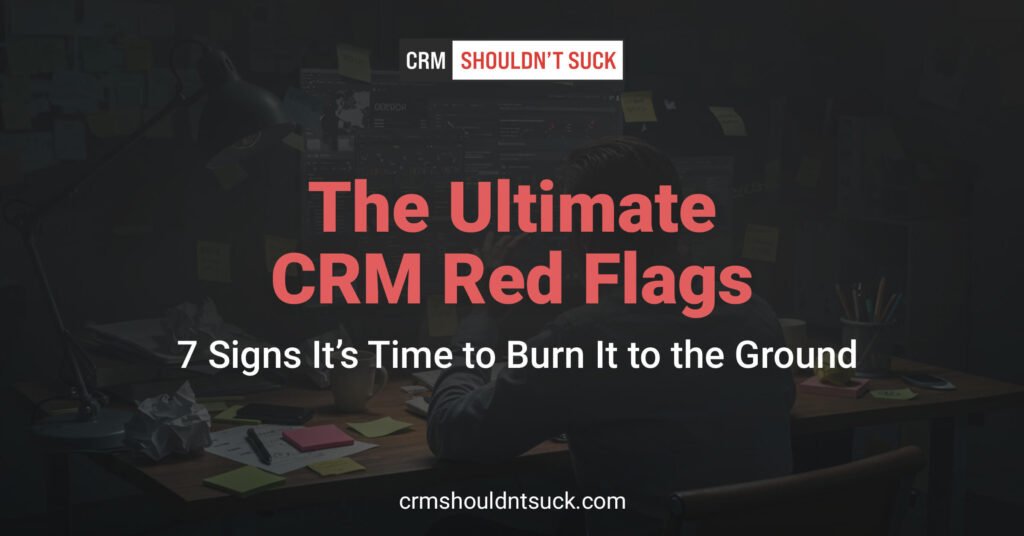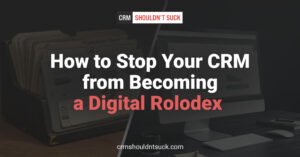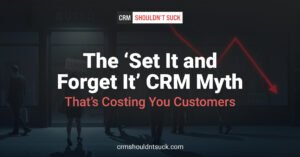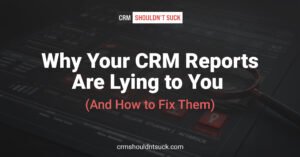When Your CRM Becomes a Liability Instead of an Asset
There comes a point when every sales leader looks at their CRM and wonders, Is this thing actually helping us sell more, or is it just getting in the way? A CRM should be a revenue engine, not a roadblock. Yet, too many companies stick with systems that frustrate their teams, create inefficiencies, and fail to deliver insights that move the business forward.
If you’re questioning whether your CRM is still the right fit, you’re not alone. Here are seven red flags that indicate it might be time to ditch your current system and find one that actually works for you.
1. Your Sales Team Avoids Using It
A CRM that salespeople hate is a CRM that fails. If your team finds the system cumbersome, time-consuming, or useless, they will work around it rather than within it. This leads to incomplete data, poor pipeline visibility, and frustrated leadership. A CRM should make a salesperson’s job easier, not harder. If logging calls and updating opportunities feels like a second job, your CRM is failing.
Fix It or Burn It?
If user adoption is low, evaluate whether the system is too complex, unintuitive, or time-consuming. If training and process improvements don’t solve the issue, it’s time to move on.
2. Data is Inaccurate, Outdated, or Duplicated
Your CRM is only as good as the data inside it. If reports are filled with missing fields, duplicate contacts, and outdated information, it’s impossible to make informed decisions. When leadership questions the reliability of CRM data, trust erodes, and decisions are made on gut instinct rather than hard numbers.
Fix It or Burn It?
If bad data is the result of poor training or lax data governance, implement stricter guidelines. But if your CRM lacks the automation and controls to maintain data hygiene, it’s time to consider a system that does.
3. It Feels Like a Digital Filing Cabinet, Not a Sales Tool
A CRM should be more than a place to store customer information—it should actively drive sales. If your system is nothing more than a glorified contact database, it’s failing its purpose. Your CRM should provide real-time insights, automate follow-ups, and help sales reps move deals forward.
Fix It or Burn It?
If your CRM lacks automation, AI-driven insights, or the ability to track meaningful sales activities, upgrading to a more dynamic system should be a priority.
4. Reporting is a Nightmare
Leadership depends on CRM data to forecast revenue, track pipeline health, and make strategic decisions. If generating reports requires pulling data into spreadsheets, manipulating fields, and manually cleaning up numbers, your CRM is making your job harder, not easier. Worse, if the reports it produces are unreliable or inconsistent, your entire sales strategy is built on a weak foundation.
Fix It or Burn It?
If reporting issues stem from poor implementation or lack of training, they can be fixed. But if your CRM fundamentally lacks the customization and automation needed for real-time insights, it’s time to move on.
5. It Doesn’t Integrate with the Rest of Your Tech Stack
Your CRM should be the central hub of your sales and marketing efforts. If it doesn’t integrate seamlessly with your email, marketing automation, ERP, and other business tools, your team is wasting time on manual workarounds. Every disconnected system adds friction, delays, and inefficiencies.
Fix It or Burn It?
If your CRM doesn’t play well with the other platforms your business depends on, you either need an integration strategy or a new system that is built to connect with your tech stack.
6. It’s Slowing Your Sales Process Down
A CRM should speed up sales, not bog it down. If your team spends more time entering data than selling, something is wrong. A modern CRM should automate repetitive tasks, provide one-click updates, and reduce administrative burden so sales reps can focus on closing deals.
Fix It or Burn It?
If your CRM requires excessive manual input, re-evaluate workflows and automation capabilities. If streamlining processes isn’t an option, it’s time to find a system that prioritizes efficiency.
7. Your CRM is Outdated and Expensive
Many companies stick with outdated CRMs because they’ve invested so much time and money into them. But if your CRM is costing more than it’s delivering—whether in licensing fees, maintenance, or lost productivity—it’s time to re-evaluate. A clunky, outdated system will always hold you back, no matter how much effort you put into making it work.
Fix It or Burn It?
If your CRM costs are high but value is low, run a cost-benefit analysis. If switching to a modern, more effective system will improve efficiency and drive revenue, don’t let sunk costs keep you trapped.
The Bottom Line: Your CRM Should Work for You, Not Against You
If your CRM is showing any of these red flags, it’s time for a serious conversation about whether to fix it or find a new solution. The right CRM should empower your sales team, provide actionable insights, and integrate seamlessly into your workflow. Anything less is just getting in the way.
Don’t stay stuck with a CRM that sucks. Find a system that supports your sales process, drives efficiency, and actually helps your business grow.



